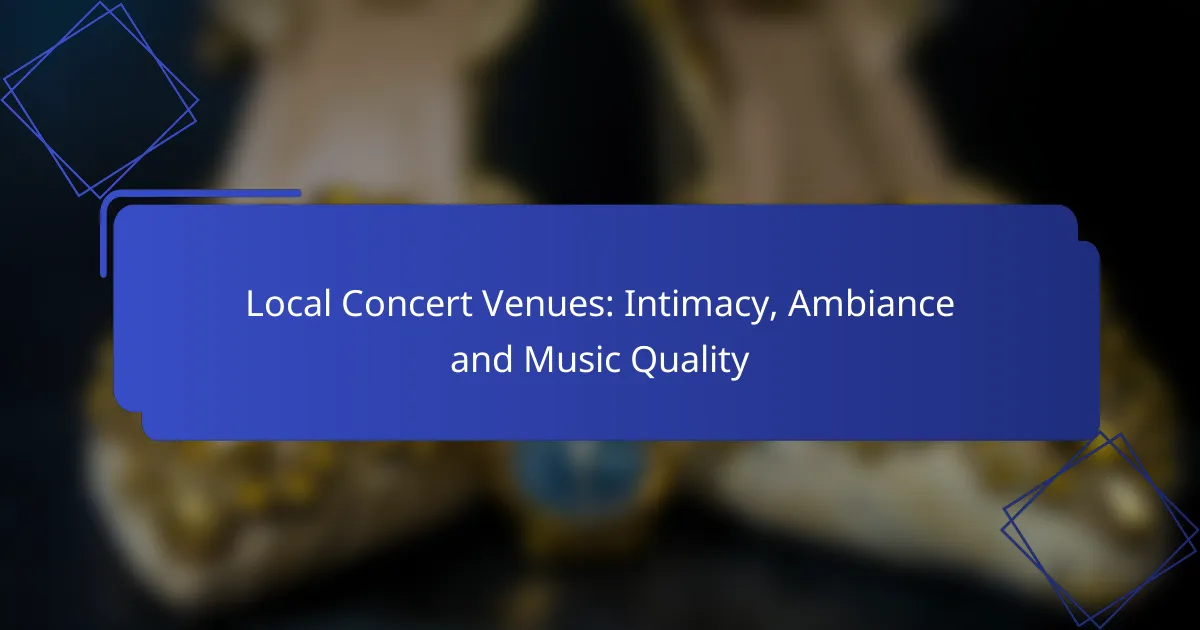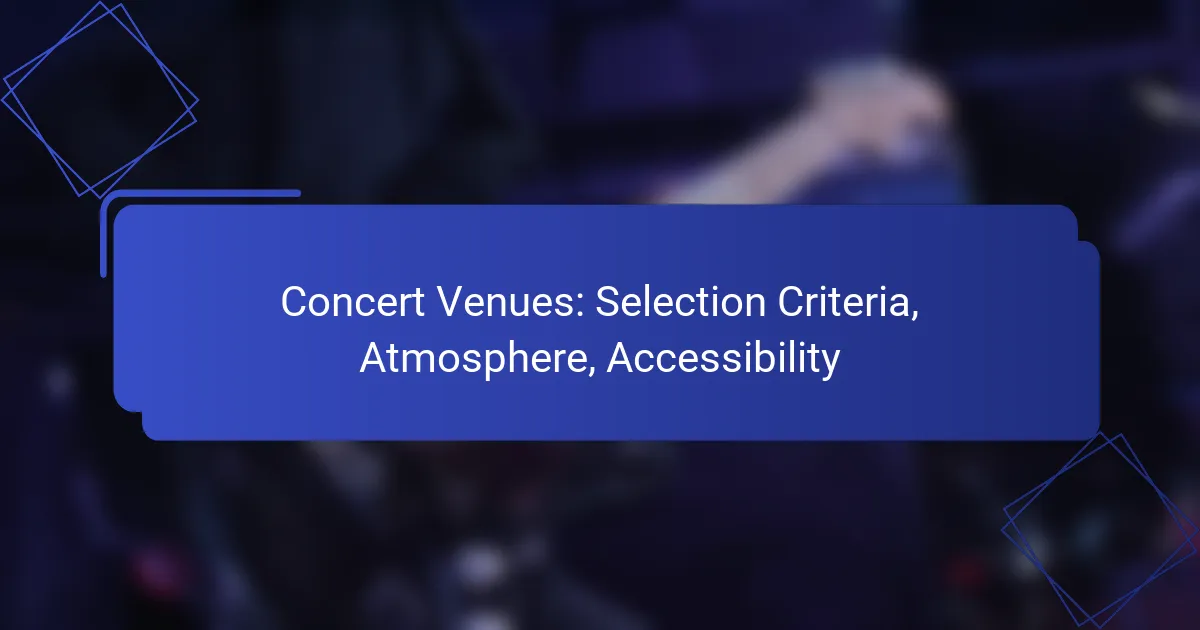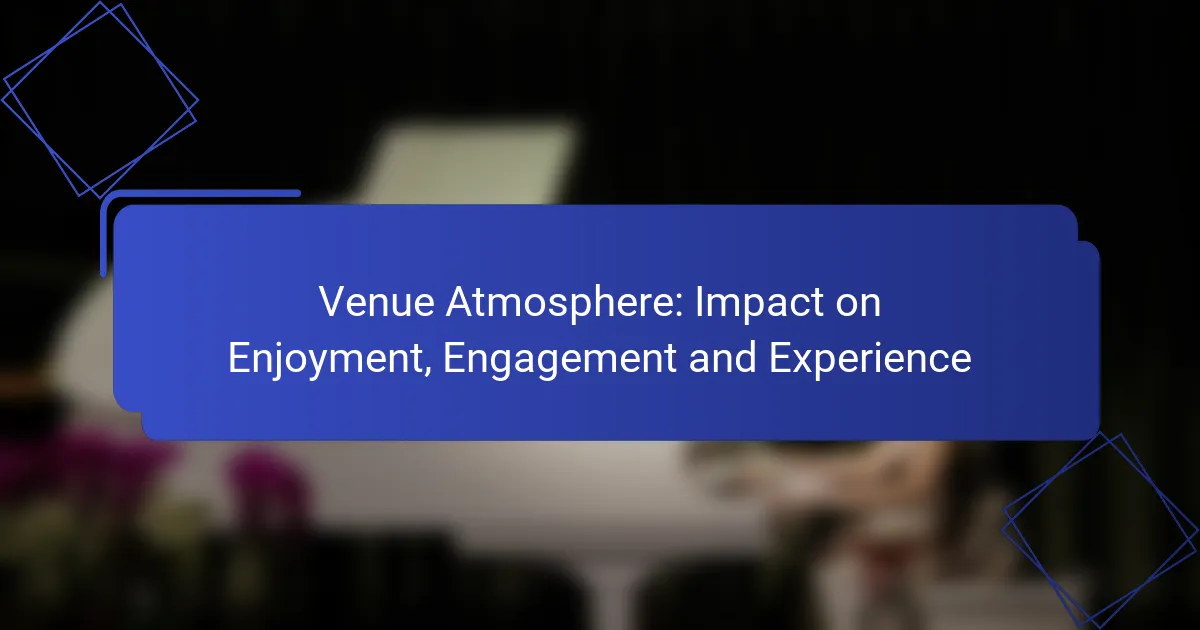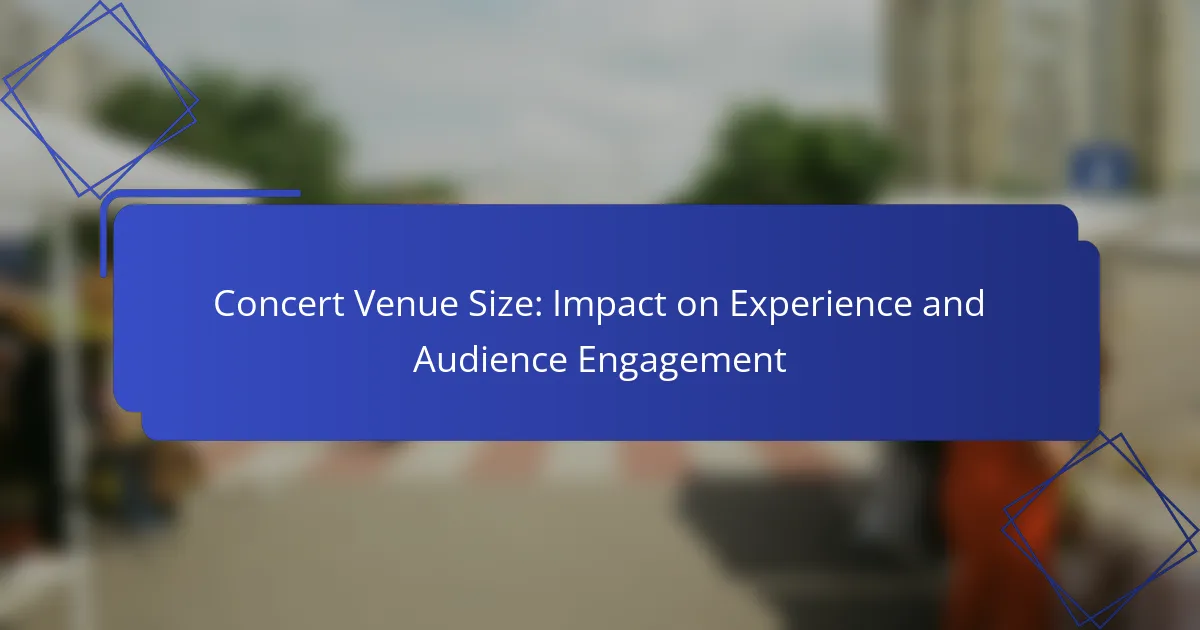Los Angeles is home to a diverse array of concert venues that offer an intimate atmosphere, exceptional ambiance, and high-quality music experiences. These venues are designed to enhance sound quality and engage audiences, making each live performance memorable. The unique characteristics of each location, from lighting to layout, contribute significantly to the overall enjoyment of the music.

What are the best local concert venues in Los Angeles?
Los Angeles boasts a variety of exceptional concert venues that offer unique experiences in terms of intimacy, ambiance, and music quality. The best venues cater to different musical tastes and provide memorable atmospheres for live performances.
The Greek Theatre
The Greek Theatre is an iconic outdoor venue nestled in Griffith Park, known for its stunning natural backdrop and excellent acoustics. With a capacity of around 5,900, it creates an intimate setting while still attracting major artists across various genres.
When attending a concert here, consider arriving early to enjoy the surrounding park and the view of the Hollywood Hills. The venue’s layout allows for great sightlines from almost any seat, enhancing the overall experience.
The Troubadour
The Troubadour is a legendary small venue located in West Hollywood, famous for its rich history and vibrant atmosphere. With a capacity of about 400, it has hosted numerous iconic artists, making it a must-visit for music lovers.
Due to its size, the Troubadour offers an up-close experience with performers, allowing fans to connect with the music on a personal level. Tickets can sell out quickly, so it’s wise to purchase them in advance.
The Wiltern
The Wiltern is a beautifully restored Art Deco theater that accommodates around 1,850 guests. Its stunning architecture and excellent sound quality make it a favorite for both artists and audiences alike.
When attending a show at The Wiltern, be sure to explore the venue’s unique design and enjoy the bar offerings. The seating arrangement provides a good view of the stage from most areas, enhancing the concert experience.
The Roxy Theatre
The Roxy Theatre, located on the Sunset Strip, is a renowned venue with a capacity of about 500. It has a rich history of hosting legendary performances and continues to be a hotspot for emerging artists.
For a memorable night, check the schedule for both established and up-and-coming acts. The Roxy’s intimate setting allows for a personal connection with the performers, making it a favorite among concertgoers.
The Fonda Theatre
The Fonda Theatre is a stylish venue in Hollywood that holds approximately 1,200 people. Its combination of modern amenities and vintage charm creates a unique concert atmosphere.
Attendees can enjoy a variety of genres in a comfortable setting, with a balcony that offers an excellent view of the stage. Arriving early can enhance your experience, as the venue often features a lively bar scene before shows.
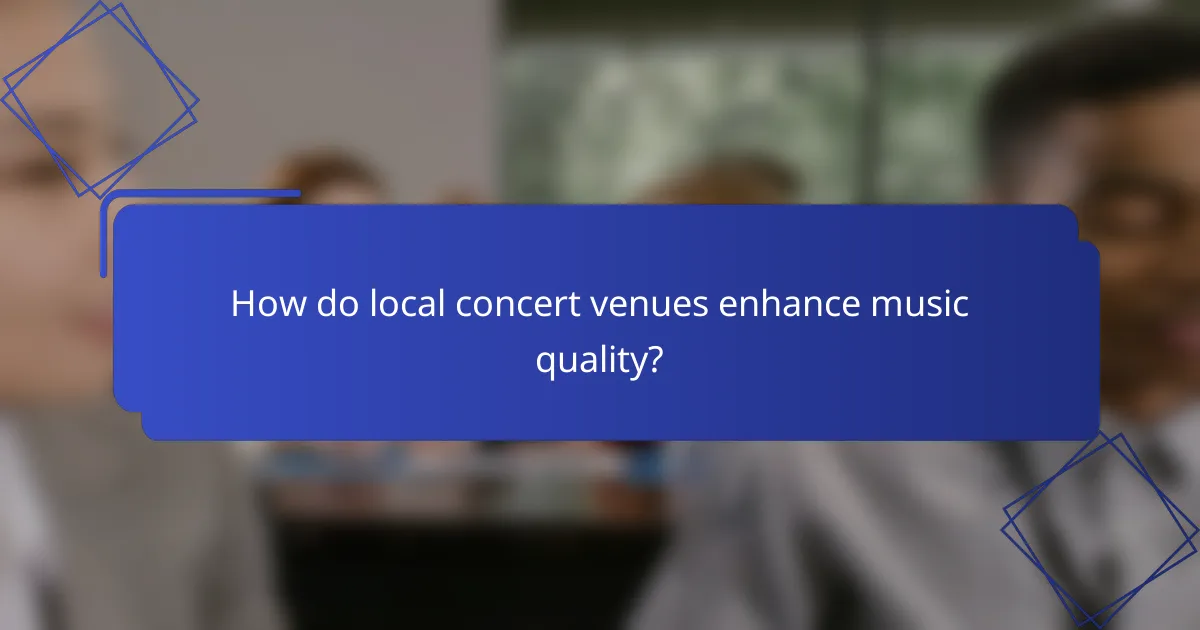
How do local concert venues enhance music quality?
Local concert venues enhance music quality through their unique design, intimate settings, and superior sound systems. These elements work together to create an immersive experience that elevates the performance and engages the audience.
Acoustic design features
Acoustic design is crucial for optimizing sound quality in local concert venues. Features such as sound-absorbing materials, strategic wall angles, and ceiling height can significantly influence how sound waves travel and resonate within the space. Venues that prioritize these elements often provide a richer and more balanced auditory experience.
For example, venues may use acoustic panels or diffusers to minimize echoes and enhance clarity. The layout of the seating can also affect sound distribution, ensuring that all audience members receive a similar quality of sound, regardless of their location.
Intimate audience experience
Intimacy in local concert venues fosters a deeper connection between artists and their audience. Smaller venues typically allow for closer proximity to performers, creating a personal atmosphere that larger arenas cannot replicate. This closeness can enhance the emotional impact of the music.
Moreover, intimate settings often encourage audience interaction, such as sing-alongs or direct communication with artists. This engagement can elevate the overall experience, making it memorable and unique for attendees.
Sound system quality
The quality of the sound system is a key factor in delivering an exceptional music experience at local concert venues. High-quality speakers, amplifiers, and mixing equipment can make a significant difference in how music is perceived. Venues that invest in top-notch sound systems are better equipped to handle various genres and performance styles.
When evaluating a venue, consider the reputation of its sound system and any recent upgrades. Venues that regularly host live music often have technicians who fine-tune the sound for each performance, ensuring optimal audio quality for both artists and attendees.

What factors contribute to the ambiance of concert venues?
The ambiance of concert venues is shaped by various elements, including lighting design, venue layout, and historical significance. Each of these factors plays a crucial role in creating an immersive experience that enhances the overall enjoyment of the music.
Lighting design
Lighting design significantly influences the mood and atmosphere of a concert venue. Effective lighting can highlight performers, create dramatic effects, and enhance the emotional connection to the music. Venues often use a combination of spotlights, colored lights, and ambient illumination to craft a unique visual experience.
When selecting a venue, consider how the lighting complements the type of music being performed. For example, a rock concert may benefit from dynamic, colorful lights, while a classical performance might require softer, more subdued lighting to maintain focus on the musicians.
Venue layout
The layout of a concert venue affects both the audience’s experience and the sound quality. An intimate layout, where the audience is close to the stage, fosters a personal connection between performers and attendees. This proximity can enhance the overall enjoyment of the performance.
Consider the seating arrangement and acoustics when choosing a venue. Venues with tiered seating or a sloped floor can improve sightlines and sound distribution, ensuring that all attendees have a good view and experience the music as intended.
Historical significance
A concert venue’s historical significance can add depth to the overall ambiance. Venues with a rich history often have unique architectural features and stories that enhance the experience for attendees. This connection to the past can create a sense of nostalgia and appreciation for the music being performed.
When selecting a venue, research its history and past performances. Venues that have hosted legendary artists or significant events can provide a memorable backdrop that enriches the concert experience, making it more than just a performance but a part of a larger musical narrative.
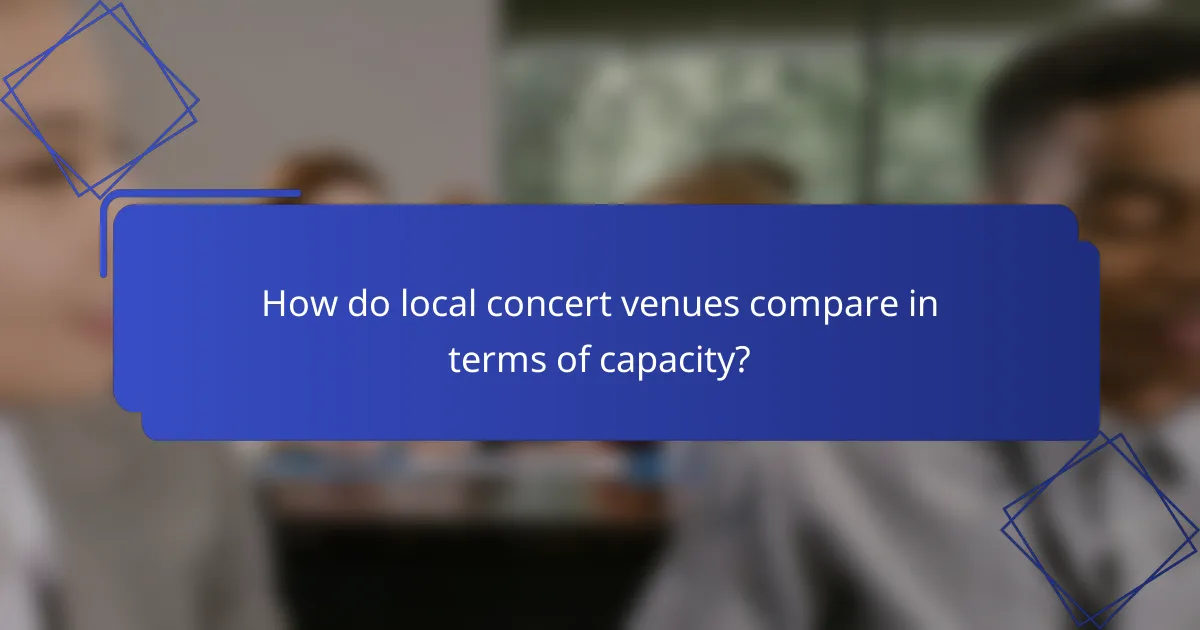
How do local concert venues compare in terms of capacity?
Local concert venues vary significantly in capacity, impacting the overall experience for both artists and audiences. Smaller venues offer intimacy, while larger spaces can accommodate more fans but may sacrifice ambiance.
Small venues (under 500 seats)
Small venues, typically hosting fewer than 500 attendees, create a close-knit atmosphere that enhances the connection between performers and the audience. These spaces often feature unique layouts, allowing for better sightlines and sound quality.
Examples include local bars, small theaters, and community centers. They often showcase emerging artists and provide an opportunity for fans to enjoy live music in a more personal setting.
Medium venues (500-2000 seats)
Medium venues, accommodating between 500 and 2000 guests, strike a balance between intimacy and capacity. They can host a wider range of artists, from local bands to regional acts, while still maintaining a relatively close experience.
These venues often include dedicated concert halls and larger clubs, which may offer enhanced sound systems and lighting. They are ideal for music lovers who appreciate a vibrant atmosphere without the overwhelming size of large arenas.
Large venues (over 2000 seats)
Large venues, with capacities exceeding 2000, cater to major artists and large-scale productions. While they can draw significant crowds, the experience may feel less personal due to the distance between performers and audience members.
Examples include stadiums and large amphitheaters, which often feature advanced sound technology and elaborate staging. While these venues provide a thrilling experience with high-profile acts, they can lack the warmth found in smaller settings.
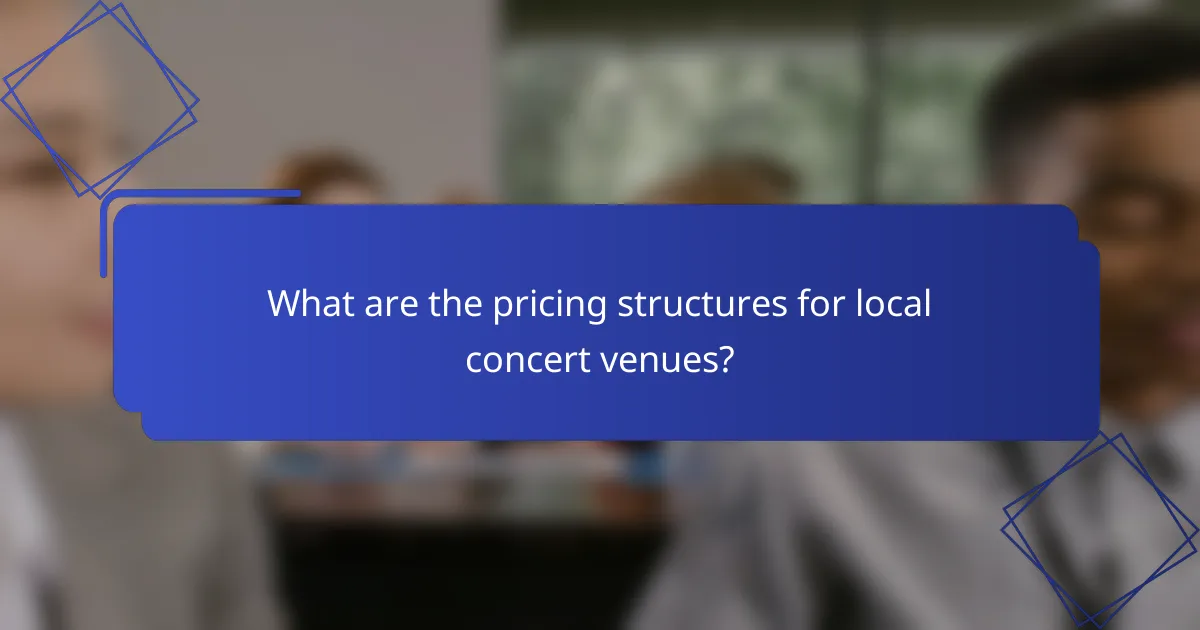
What are the pricing structures for local concert venues?
Local concert venues typically have varied pricing structures that cater to different audience segments and experiences. Factors influencing these prices include the venue’s size, location, and the popularity of the performing artists.
Ticket pricing tiers
Ticket pricing tiers at local concert venues often range from general admission to premium seating options. General admission tickets may start at around $20 to $50, while reserved seating can go from $50 to over $150, depending on the artist and venue.
It’s common for venues to offer different tiers that provide varying levels of access and amenities. For example, a basic ticket might include entry only, while a mid-tier ticket could offer access to better seating or additional perks like merchandise discounts.
VIP packages
VIP packages at local concert venues usually include exclusive benefits such as premium seating, early entry, and meet-and-greet opportunities with artists. These packages can range from $100 to several hundred dollars, depending on the event’s exclusivity and the artist’s fame.
When considering VIP packages, evaluate what is included to ensure you receive value for the price. Some packages may also offer complimentary drinks or merchandise, enhancing the overall concert experience.
